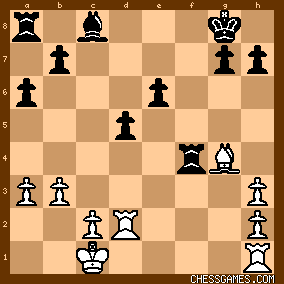KEG: Post III
In the last diagrammed position, Rosen could have turned the screws on Marshall with 21...a5. Instead he gave Marshall chances: 21... Rf5
22. Qh3 QxQ
23. gxQ Nf4
Another weak move by Rosen. 23....a5 was far better. 24. Bg4 Rf6
25. NxN?
It is hard to understand why Marshall fancied his chances in the ensuing endgame. Better and more in Marshall's style was 25. Re1 25... RxN
The position was now:

click for larger viewAt first blush, it may seem hard to believe that Rosen lost this game. He is up a pawn, and Marshall's King-side pawns are a mess.He has a passed pawn. And Marshall has little chances of attack. At worst, one might think, Rosen would have to settle for a draw. But---there is no big caveat here. The rules at the Paris 1900 tournament called for draws to be replayed. Thus, had Rosen drew the game, he would have had to play Marshall again Given their respective standings [Marshall was 8-3 and Rosen was 2-8 going into this game] a draw might have been no better than a loss for Rosen. So he pressed hard for a win here, and lost most of all of his advantage by move 27, lost his pawn plus by move 29, and then had what was probably a lost position by move 30. What a turnaround! 26. Re1 Kf7
27. c4!
The lion has awakened. The text forces Rosen to abandon his seemingly powerful center pawn phalanx. 27... d4?
Rosenthal in the Tournament Book says that 27...dxc4 [best!] 28. Rd8 "favors White." But this is nonsense. After 28...cxb3, Rosen would have needed time to untangle his Queen-side and might not be able to win, but to say that the position favored Marshall seems daft. After the text, Rosen seems destined to lose his pawn-plus. His winning chances suddenly seem gone. 28. Rde2!
Focusing on Black's weak point.
28... e5
Another poor choice by Rosen. 28...Bd7 or 28...b6 or even 28...Kf8 were better. Now, in addition to regaining his lost pawn, Marshall is able to undouble his King-side pawns. 29. Rxe5 BxB
30. hxB Rd8?
Terrible. Rosen could probably have held the game with 30...Rxg4. Now, his house comes tumbling down. A look at the position shows how much progress Marshall has made, and how badly Rosen has managed to mangle what had been a likely won endgame. 
click for larger viewAs I will show in my next post, Marshall almost blew his winning edge here, but soon got back on track and then--with a few hiccups--worked his way through the cumbersome task of winning a double-Rook endgame. | 




